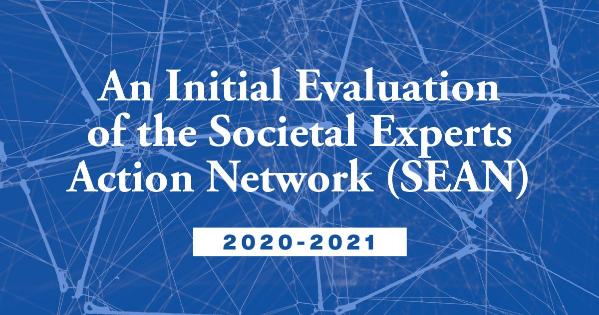SPA Professors Publish Evaluation Report on NASEM Pandemic Response Initiative

In March of 2020, as U.S. COVID cases and deaths rose, policymakers at all levels of government looked for fast guidance on pandemic response. In answer, the National Academies of Sciences, Engineering, and Medicine (NASEM), with support from the National Science Foundation (NSF) and the Alfred P. Sloan Foundation, established the Societal Experts Action Network (SEAN). SEAN, composed of researchers in the fields of social and behavioral sciences and economics, aims to provide quick, evidence-based answers to these critical questions.
SPA Professors Elizabeth Suhay, who researches the intersection of science and politics, and Dave Marcotte, an expert on process and outcome evaluation, received a grant from the National Science Foundation in the summer of 2020 to assess SEAN’s work to date. Their report, An Initial Evaluation of the Societal Experts Action Network (SEAN), 2020-21, has just been published on SPA’s website.
“Early in the pandemic, policymakers had few places to turn,” said Suhay. “The federal government devolved the handling of the pandemic to states and localities and did not provide them with adequate information and guidance.”
NASEM has historically responded to policymaker requests for information with year or longer consensus reports on specific government-related topics. SEAN sped up this timeline by offering what is known in the scientific community as rapid expert consultations (RECs), a relatively recent concept. The team delivered short, action-oriented RECs within two to three weeks, held live webinars, and provided one-on-one advice to policymakers. Topics included strategies to promote mask-wearing, best practices for testing and contact tracing, and guidance on interpreting COVID case numbers and establishing thresholds for reopening. For example, SEAN held a series of four large webinars to inform policymakers and college presidents on returning to campus safely.
Suhay and Marcotte first evaluated SEAN’s objectives and start-up processes, by reviewing founding documents and interviewing SEAN staff and executive committee members.
“SEAN was somewhat fluid in the early weeks and months,” said Suhay. “We saw that as a good thing…It was set up very quickly during a national emergency and it was learning and evolving.”
While its initial structure remained intact, SEAN’s processes matured over the course of the pandemic. They began networking with state and local professional organizations to identify questions and disseminate answers. Soon, Suhay and Marcotte realized that SEAN’s significant early output would allow them to begin a tentative outcomes evaluation.
“Over the course of the year, it became clear that they, and we, would benefit from understanding a little bit more about how [SEAN products] were used by their targeted consumers,” said Marcotte.
To assess outcomes, Suhay and Marcotte conducted a survey of about 200 SEAN users and interviewed intermediary organizations representing policymakers.
“It is clear that SEAN was hugely successful,” said Marcotte. “Users really valued the information in these webinars, and many actually changed organizational policies as a result. It addressed its original objectives.”
“SEAN did a very good job creating reports and webinars for lay people,” Suhay agreed. “However, they needed to work to avoid being too technical and to provide more action-oriented takeaways, which are important for people in the policy world.”
Suhay and Marcotte both emphasized the need to reach additional users: their analysis revealed that only a minority of webinar attendees self-identified as policymakers.
“If SEAN is going to continue, it needs to expand its audience,” Marcotte said. “You want to grow your market share.”
Suhay invited others to join this market for providing rapid expert consultations (RECs).
“The SEAN model of providing RECs to policymaker questions could be expanded beyond COVID and beyond the social sciences,” she said. “I hope it can draw some imitators.”
The SPA team gave a special shout-out to the full-time NASEM staff who helped coordinate the project, the SEAN executive committee, and the experts themselves.
“The folks who put SEAN together were volunteers trying to do service for their country in an unparalleled time,” said Marcotte.
NASEM hopes that SEAN can continue as a pandemic resource and expand its pool of expertise to address other issues, such as climate change. For more information about SEAN, read the evaluation report here or visit their website.
